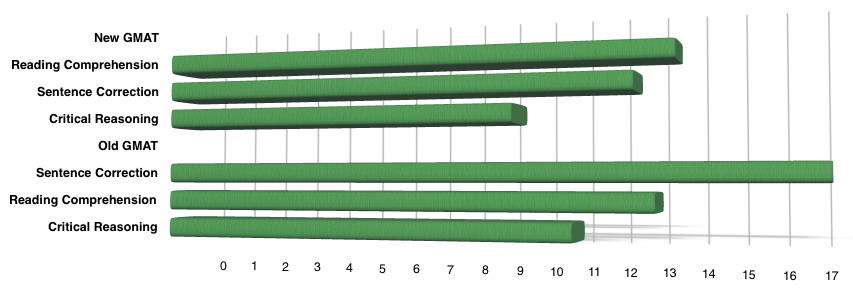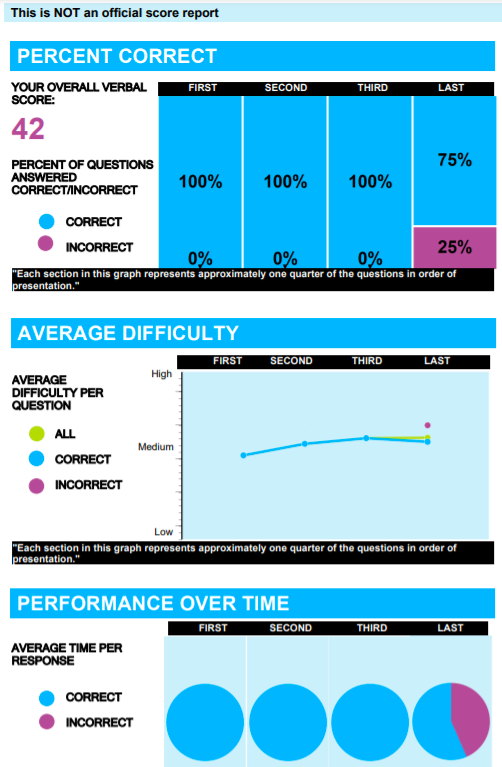Bunuel wrote:
1. What is the importance of the first 10 questions?
Experiment: We will try to disprove the myth the way
OG/GMAC positions it: the first 10 questions are not critical
Methodology: we will attempt the worst case scenario and will answer the first 10 questions incorrectly (not guess but incorrectly); then we will attempt to answer the remaining 21 questions correctly (not guess)
Result: Score - Q30. Percentile - 19th (!!!). First 10 questions WRONG. The next 21 questions CORRECTAnalysis: obviously something is not right with the myth about the first 10 questions. They appear to be very important on the Quant. If you miss the first 10 (probably not a very realistic scenario for most) you have no way of climbing out of the hole - almost all questions that were offered to me were generally easy/medium difficulty.
I posted about this question in the previous GMATPrep scenarios thread, but I'll try one more time. To me, this experiment proves the opposite: that early questions are not more important than later ones. But we need to properly define our expectations in advance of a study like this: what score should we reasonably expect a test taker could achieve if they answer their first ten questions incorrectly?
From the conclusion drawn above, and the evidence used to support it (which I'm reading this way: "we get a Q50 with our first 21 right and last 10 wrong, but a Q30 with our last 21 right and first 10 wrong, therefore the first ten questions are especially important"), I'm inferring that some people expect you should get a similar score in those two scenarios. But you very clearly should not get even remotely similar scores in those situations (as I explain below). I find it remarkable you can even get a Q30 if you get your first ten questions wrong.
I'll simplify things a lot, to avoid any complicated math: for each question, the GMAT algorithm knows the probability that a 300-level test taker will answer correctly, and that a 500-level test taker will, and that a 700-level test taker will (and any other level of course). Using those probabilities, when the algorithm knows a test taker's right and wrong answers to many questions, the algorithm can work out using some probability theory what a test taker's most likely ability level is. That's all the scoring algorithm is really doing.
Now, let's ask "how likely is it that a 700-level test taker (so Q47 ish) would answer the first ten questions incorrectly?" We can't answer that precisely without knowing exactly how hard each question is, but since the test is adaptive, say we assume the first three questions are 500, 400, and 300 level, and then the next seven questions are all 300 level. GMAT questions, in the language of test theory, 'discriminate' very well: high level test takers rarely get easy questions wrong, and low level test takers rarely get hard questions right (except by lucky guessing, which the algorithm understands will happen 20% of the time or more). Using standard parameter values, a 700-level test taker will get a 300-level question right roughly 99% of the time. If that's not true for a certain test taker, that test taker simply is not at the 700-level, by definition. So you can already see how astronomically improbable it is that this 700-level test taker will get eight 300-level questions wrong in a row - it's (1/100)^8, or 1 in 10 quadrillion. Throw in the 400 and 500 level questions, then using the math behind the algorithm, the probability a 700-level test takers gets their first ten questions wrong is roughly 1 in 6,600,000,000,000,000,000. To put that in perspective, if one hundred 700-level test takers took the GMAT every single day since the beginning of the universe 14 billion years ago, this would still almost certainly never have happened: it would still be extremely unlikely that a 700-level test taker had answered their first ten questions incorrectly even one time, in 14 billion years. 700-level test takers simply never do this, so why should we expect the algorithm to give a Q47 score to someone who does, no matter how they perform later in the test?
Even the 500-level (Q30 ish) test taker almost never does this. It's 500,000 times more likely, if someone answers the first ten questions incorrectly, that a test taker is a 300-level test taker than a 500-level one, in the scenario I described above. In fact, the 300-level test taker also almost never does this -- even someone guessing completely at random is unlikely to do it -- but if anyone does, it's almost always someone at the absolute bottom of the scoring scale. That you can recover to reach a 500-level after that performance, even after proving to the test that you're worse than a domesticated cat pawing random answers at the keyboard, to me demonstrates that you can recover very successfully from an anomalously bad performance early in the test. Examining more realistic scenarios (while carefully defining expected results in advance) would demonstrate that.
The reverse happens when the test taker answers the first 21 questions correctly. It's extremely rare that even a Q50 level test taker will do this. You're well above a Q51 level if you do. So it shouldn't be surprising that your score doesn't drop too far after that point, even with an unusually bad performance at the end.
For test takers, the consequences are these:
- if you can get right answers early in the test, do - right answers are very valuable;
- if you can't for some questions, don't worry about it. The test can get hard early on, and a wrong answer to a hard early question doesn't hurt you any more than a wrong answer to a hard late question. You're supposed to get hard questions wrong no matter where they are in the test unless you're a top-level test taker;
- do not invest an inordinate amount of time early in the test. That will help you less than you might think early on, but will hurt you a lot later in the test.



















